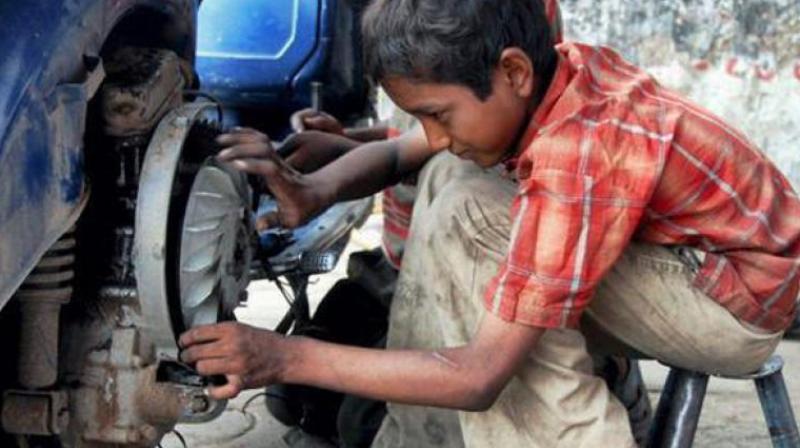The nation in 2011 had 10.1 million child labourers aged 5-14, according to census records. The estimate now is that there are 12.7 million toiling without access to a proper education.

The central government allocated Rs. 90,594 crore for children in Budget 2019, a meagre 0.01-percentage-point increase to 3.25 per cent of the overall Budget compared to last year, according to a report by the non-government organisation Child Rights and You (CRY).
Children constitute nearly 40 per cent of India’s population, yet the funds allocated for their education, development, health and protection remained almost constant, the analysis noted.
The largest chunk (68 per cent) went towards education, followed by development (26 per cent), health (3 per cent) and protection (2 per cent). While allocation for education fell 1.1 percentage points, the allocation for protection increased 0.6 percentage points from last year.
The nation in 2011 had 10.1 million child labourers aged 5-14, according to census records. The estimate now is that there are 12.7 million toiling without access to a proper education.
Prime Minister Narendra Modi’s government, run by the pro-Hindu Bharatiya Janata Party (BJP), in a budget handed down earlier this month reduced funding to help stem child labour to US$14 million from last year’s US$17 million.
This will adversely impact the federal National Child Labour Project that aims to offer free education, meals and health care to these children, according to church leaders and rights activists.
“Is there any other problem greater than this in India at present?” asked Bishop Alex Vadakumthala, who heads the Indian bishops’ office for labour.
Just because children cannot vote should not mean they don’t deserve to be able to have a decent existence, Bishop Vadakumthala said, adding that there was no clue as to why the budget allocation was reduced.
India has a law that prohibits employing children below the age of 18. But with lax enforcement, children continue to work in roadside restaurants and small-scale industries, the bishop said.
“There have been no steps to seriously implement the law,” Bishop Vadakumthala said. “The problem is that the government isn’t taking the issue seriously.”
The law has provisions to punish those who employ children with jail terms of up to two years and a fine or US$715 or both.
Puja Marwaha, chief executive of the non-government organisation Child Rights and You (CRY), told ucanews.com that the government’s 2030 Vision goal to make India a developed nation had failed to adopt a comprehensive response to combat child labour.
Just because children don’t vote, it doesn’t mean that their welfare doesn’t matter.
The February budget was the last one before national elections due in April-May, but it had no specific scheme for the welfare of children who constitute some 40 per cent India’s 1.2 billion people, she said.
Balbir Singh, also a child rights activist, said the actual number of child labourers in India could be double the official estimate.
Fear of punishment or of being stopped from going to workforce parents and even children to lie about their actual age and employment, Singh said.
“You can find children working everywhere in the country; be it in construction, vehicle repair, domestic work, carpet making, selling cigarettes on the roadside,” Singh said. “But, ironically, the government isn’t acting to end this.”
J.P. Dutta, a social activist based in Jammu, said government alone cannot address the issue effectively and that social mobilization and community participation remain vital for the eradication of child labour.
“There has to be a public interest,” he said. “An extensive awareness campaign is needed, and budgetary provisions must be made for it.”
Father Jaison Vadassery, secretary of the Indian bishops’ labour office, told ucanews.com that church people in India are already conducting awareness campaigns to educate people against tolerating child labour.
However, he believes that a more effective government system is needed to eradicate the social evil. “Until steps are taken to strictly implement the ban on child labour, the situation will not change for the better,” Father Vadassery said.
With inputs from IndiaSpends and Ucanews.com